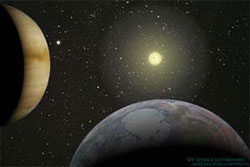Scientists find link between Earth’s orbit and climate change 85m years ago
An oxygen-free ocean from bottom to surface is probably the worst scenario that marine higher life can experience. Are processes and feedbacks linking the atmosphere to the deep ocean capable to cause a rapid change from an oxygen-rich to an oxygen-free deep ocean? And what are the consequences for the global carbon cycle that ultimately drive marine and terrestrial ecosystems and climate variation

’Light breaks where no sun shines’
Astronomers looking for earth-like planets in other solar systems — exoplanets — now have a new field guide thanks to earth and planetary scientists at Washington University in St. Louis.
Bruce Fegley, Ph.D., Washington University professor of earth and planetary sciences in Arts & Sciences, and Laura Schaefer, laboratory assistant, have used thermochemical equilibrium calculations to model the chemistry of silicate vapor a
Researchers from the National Nuclear Security Administration’s Sandia National Laboratories, together with fellow members of the Joint Water Reuse & Desalination Task Force, in coming months will be studying the best ways to desalinize – and make potable – ocean water, subsurface brines, and wastewater.
The California Department of Water Resources recently granted Sandia and its Task Force partners $1 million for the study. The Task Force – which comprises Sandia, the
Duke University Medical Center researchers have found that the naturally occurring marine toxin domoic acid can cause subtle but lasting cognitive damage in rats exposed to the chemical before birth. Humans can become poisoned by the potentially lethal, algal toxin after eating contaminated shellfish.
The researchers saw behavioral effects of the toxin in animals after prenatal exposure to domoic acid levels below those generally deemed safe for adults, said Edward Levin, Ph.D.
The biodiversity of the seas and the ocean floors is a mystery for science yet to unravel. With this curiosity, a research team – including a biologist from the University of the Basque Country, is to set sail for the second time on an oceanographic campaign to study this biodiversity of the seas and the ocean floors of the Antarctic.
Bellingshausen Sea
The expedition, aboard the oceanographic vessel, Hesperides, will shortly be working in the Bellingshausen Se
Scientists have recently recognized an imbalance in the flow of salty groundwater into the coastal ocean: considerable saltwater discharge into the ocean has been observed, but little or no return flow has been seen. Now it appears that the timing of the discharge may be key to the health of our coastal waters.
New measurements and models suggest that seasonal changes in the water table may provide clues to how water is exchanged and why the largest discharge occurs during th